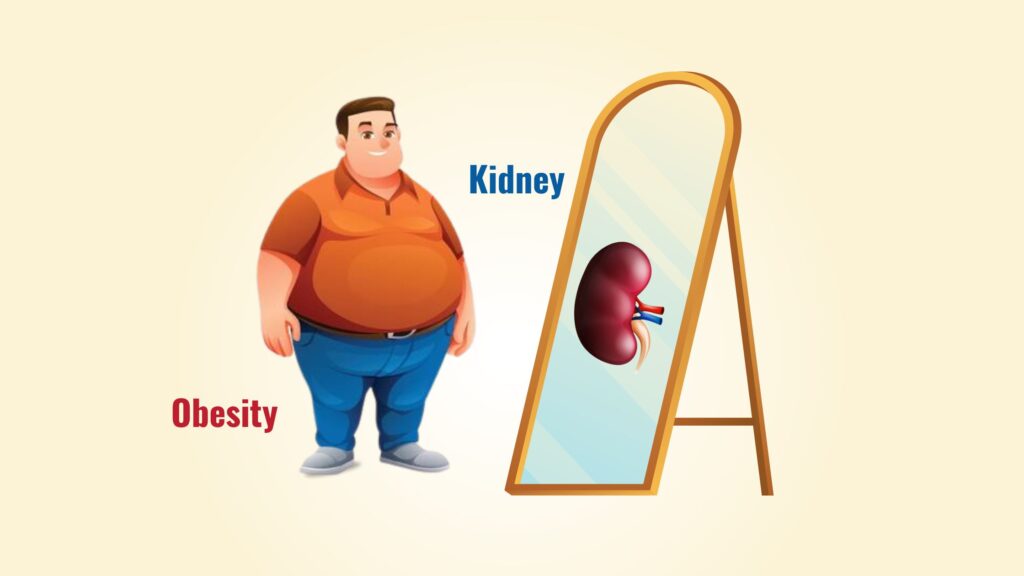The Impact of Obesity on Kidney Disease: A Deep Dive into the Link

Obesity, a chronic condition characterized by excess body fat, is a global health issue with far-reaching consequences. Beyond its well-known effects on heart health and diabetes, obesity significantly increases the risk of developing kidney disease. In this blog post, we’ll explore the intricate relationship between obesity and kidney disease, highlighting key mechanisms and offering insights into prevention and management strategies.
Understanding Kidney Disease -
To know how obesity affects the kidneys, it’s crucial to understand the role of these vital organs. The kidneys play a central role in filtering waste products from the blood, regulating fluid balance, and maintaining electrolyte levels. Chronic Kidney Disease (CKD) occurs when the kidneys are damaged and can’t filter blood as well as they should. This condition can progress over time, leading to kidney failure.
The Obesity Epidemic -
Obesity rates have been steadily rising worldwide, reaching epidemic proportions. According to the World Health Organization (WHO), obesity has nearly tripled since 1975, with over 650 million adults classified as obese in 2016. This rise has profound implications for public health, including an increased burden of obesity-related complications, such as kidney disease.
Mechanisms Linking Obesity and Kidney Disease -
The increasing burden of obesity has become a widespread public health issue in the adult and child population, rising in epidemic proportion especially in the western world. It is widely suggested that obesity is closely related to CVDs and other metabolic diseases such as hypertension, insulin resistance, T2D mellitus, and chronic inflammation. In addition, several large population studies, together with epidemiologic data, observed a strong association between obesity and a high risk of developing and progressing CKD and end-stage renal disease.
Glomerular Hyperfiltration: Obesity leads to an elevated glomerular filtration rate (GFR), indicating increased blood flow to the kidneys. This excess workload can strain the kidneys, potentially causing damage over time
Insulin Resistance and Diabetes: Obesity is a key factor in developing insulin resistance and type 2 diabetes. Both conditions can harm the kidneys and heighten the risk of chronic kidney disease (CKD).
Hypertension: Obesity often coincides with hypertension, which can harm the kidneys’ blood vessels and hinder their function.
Inflammation: Adipose tissue in obese individuals produces inflammatory cytokines, which can harm the kidneys and contribute to CKD development..
Dyslipidemia: Obesity is frequently linked to abnormal lipid levels, which can harm the kidneys.
Obstructive Sleep Apnea (OSA): Obesity is a key risk factor for OSA, which has been connected to a higher risk of CKD.
Increased Risk of Kidney Stones: Obesity is linked to a greater risk of kidney stones, which can result in kidney damage.
Prevention and Management Strategies:
Maintaining a Healthy Weight: Losing weight through a combination of a balanced diet and regular exercise can reduce the risk of developing kidney disease.
Controlling Blood Pressure and Blood Sugar Levels: Monitoring and managing blood pressure and blood sugar levels can help prevent kidney damage.
Healthy Diet: A diet rich in fruits, vegetables, whole grains, and lean proteins can help maintain a healthy weight and reduce the risk of kidney disease.
Regular Exercise: Physical activity is crucial for maintaining a healthy weight and reducing the risk of obesity-related complications, including kidney disease.
Avoiding Tobacco and Excessive Alcohol: Both tobacco and alcohol can damage the kidneys and should be avoided or consumed in moderation.
How Bariatric Surgery Helps?
Bariatric surgery is a highly effective treatment for obesity that can lead to significant weight loss and improvement in obesity-related health conditions, including kidney disease.
Bariatric surgery results in substantial weight loss, which can reduce the strain on the kidneys and improve kidney function. It also improves insulin sensitivity and reduces the risk of diabetes, thus lowering the risk of kidney disease. It leads to a reduction in blood pressure, which can help protect the kidneys from damage. Bariatric surgery can reduce the inflammatory response associated with obesity, which may help protect the kidneys. It improves lipid levels, which can reduce the risk of kidney damage.
In conclusion, Obesity is a major risk factor for kidney disease, but bariatric surgery offers hope. By promoting weight loss and improving metabolic health, bariatric surgery can significantly reduce the risk of kidney disease and improve overall health outcomes for individuals struggling with obesity. It’s important for healthcare providers to consider bariatric surgery as a potential treatment option for obese patients at risk of kidney disease, as it can be a life-changing intervention
Read also; The Cost of Bariatric Surgery in India
Why We Are?
- Asia's Trusted Bariatric Center
- Centre of Excellence
- Patient Trusted Highly Volume Bariatric Center in Mumbai
- EMI, Cashless & Mediclaim Facilities are Available
- Daily Patients Follow-up after Bariatric Surgery
- Patient Support Group Every Month
- Obesity Awareness Program
- Available with Latest Technologies
- 18+ Experience in Weight Loss Bariatric Surgery
- 300+ Weight Loss Diet Plan & Recipes
- Highly Trained & Experienced Bariatric Nutritionist
- Patient WhatsApp Chat Group
- & Many More
Medically reviewed by Dr. Manish Motwani, Bariatric & Metabolic Laparoscopic Bariatric Surgeon — Curated by Mubashshira







